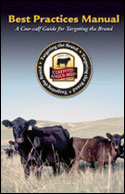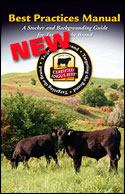Cow Nutrition Affects
Newborn Calf Survival
Protein levels play a vital role.
Russ Daly, Extension veterinarian at South Dakota State University, says cold stress in calves may be aggravated by nutritional issues in the cows. If the cow is in poor condition or doesn't have adequate protein and energy during late gestation, the newborn calf has decreased amounts of brown fat for energy reserves and chills more quickly.
"Protein and energy are crucial, and there's also research that shows supplying supplemental fat to cows during late gestation helps calves handle cold weather. Much of what producers do revolves around economics and logistics. Some years, we're just happy to see people getting adequate protein into those cows," says Daly. If cows have adequate protein, they produce a healthier, stronger fetus, resulting in a more vigorous calf at birth and fewer calving problems. Cows that are not protein-deficient also produce better colostrum.
Several decades ago some ranchers who calved early lost calves to weak calf syndrome. Studies determined this was primarily a problem in calves from young cows, caused by deficiency in dietary protein during late gestation.
In 1971-1972, a research group from University of Idaho led by Richard Bull collected and analyzed thousands of blood and tissue samples from healthy calves, weak calves and their dams. They found that weak calves — from protein-deprived dams — were not physiologically normal and didn't absorb colostrum antibodies efficiently. When these calves were stressed by cold, the duration and efficiency of antibody absorption from colostrum were greatly reduced. If the immune system of the newborn is already compromised because of protein deprivation in the dam, likelihood is high that it won't survive.
The researchers worked with four cooperating ranches (150- to 1,100-cow herds) with history of weak calf syndrome. During the study, all cows were fed a customized mineral supplement developed by Bull to make sure the problem wasn't due to mineral deficiency. Protein levels of feeds were tested. Protein for young cows was increased on two ranches, using higher-quality forage or addition protein supplement. Weak calf syndrome was virtually eliminated on those two ranches, while incidence remained the same on the other two ranches.
Bull demonstrated through subsequent studies that protein requirements of 2-year-old cows in the last 45 days of gestation was 1.81 pounds (lb.) of crude protein per day. As a result of his research, the National Research Council (NRC) increased its recommendation for protein to 7% crude protein for mature cows, and 10% protein for young cows.
 When calving early — as many western ranchers do because they depend on public range and want calves born and cows bred before going to summer range — cows are on harvested feeds rather than green grass during those last crucial weeks of pregnancy. This, combined with cold stress, can put calves at risk.
When calving early — as many western ranchers do because they depend on public range and want calves born and cows bred before going to summer range — cows are on harvested feeds rather than green grass during those last crucial weeks of pregnancy. This, combined with cold stress, can put calves at risk.
"It's sometimes hard to separate out nutritional factors and bad weather," says Daly. These can be interrelated in causing weak calves.
[Click here to go to the top of the page.]





